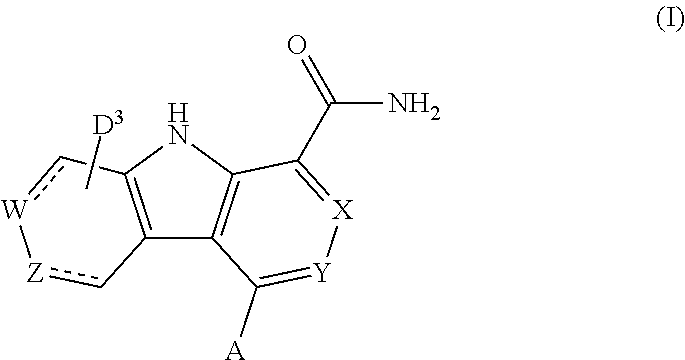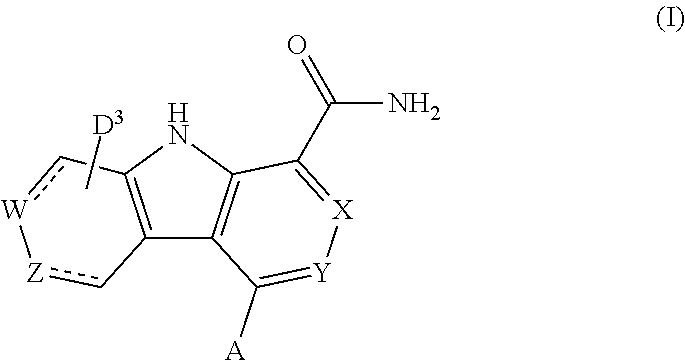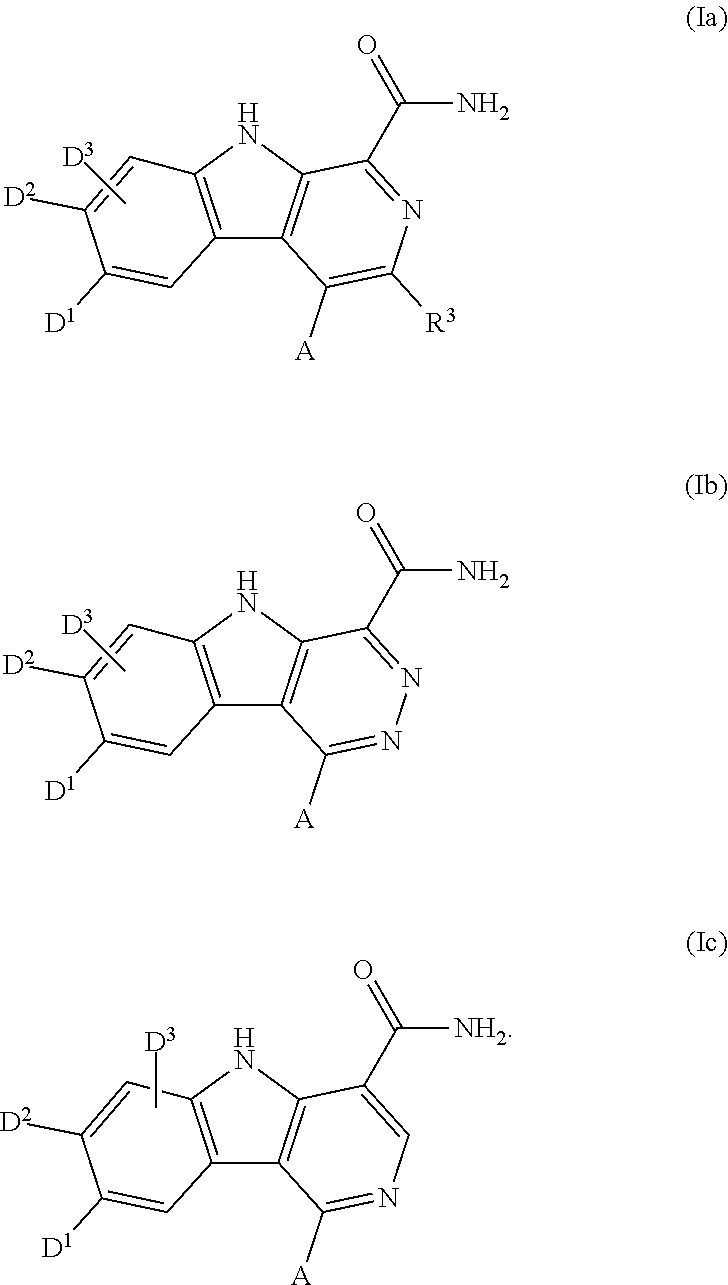Carboline carboxamide compounds useful as kinase inhibitors
a carboxamide and carboxamide technology, applied in the field of carboxamide carboxamide compounds useful as kinase inhibitors, can solve problems such as marked improvement of disease progression
- Summary
- Abstract
- Description
- Claims
- Application Information
AI Technical Summary
Benefits of technology
Problems solved by technology
Method used
Image
Examples
examples 1 and 2
4-(2-Fluorophenyl)-7-morpholino-9H-pyrido[3,4-b]indole-1-carboxamide, and 8-Chloro-4-(2-fluorophenyl)-7-morpholino-9H-pyrido[3,4-b]indole-1-carboxamide
[0300][0301]1. 4-(1H-indol-6-yl)morpholine
[0302]A mixture of 1H-indol-6-amine (3.14 g, 23.76 mmol), 1-chloro-2-(2-chloroethoxy)ethane (4.18 mL, 35.6 mmol), and sodium carbonate (10.07 g, 95 mmol) in t-BuOH (90 mL) was heated at 100° C. in a pressure tube for 3.5 days. On cooling to room temperature, the mixture was diluted with ethyl acetate and filtered through CELITE®. The filtrate was concentrated under vacuum to dryness. To the residue was added water (50 mL). The mixture was adjusted to pH 11 with saturated NaHCO3 solution and extracted with CH2Cl2 (4×80 mL). The combined extract was washed with brine (50 mL) and dried over anhydrous MgSO4. The desired product (3.96 g, 19.58 mmol, 82% yield) was isolated as a beige solid with ISCO (300 g silica gel, solid loading, 20-50% ethyl acetate / hexane).
2. 4-(3-(1-(2-Fluorophenyl)-2-nitroet...
example 3
4-(2-Fluorophenyl)-7-(morpholine-4-carbonyl)-9H-pyrido[3,4-b]indole-1-carboxamide
[0314]
1. (1H-Indol-6-yl)(morpholino)methanone
[0315]
[0316]A solution of morpholine (1.320 mL, 15.14 mmol), 1H-indole-6-carboxylic acid (2.0332 g, 12.62 mmol), 1-(3-dimethylaminopropyl)-3-ethylcarbodiimide hydrochloride (EDC) (3.63 g, 18.92 mmol), 1-hydroxybenzotriazole (HOBt) (2.90 g, 18.92 mmol) and diisopropylethylamine (DIPEA) (6.61 mL, 37.8 mmol) in DMF (31.5 mL) was stirred overnight. The reaction was poured into a 1:1 water:brine solution and extracted with EtOAc (2×). The organic layers were combined and washed with 0.25 M aqueous KHSO4, water, brine and 10% aqueous LiCl; dried over Na2SO4, filtered and concentrated in vacuo. Trituration with Et2O provided the desired product (2.20 g, 9.58 mmol, 76% yield) as a light tan solid.
2. (3-(1-(2-Fluorophenyl)-2-nitroethyl)-1H-indol-6-yl)(morpholino)methanone
[0317]
[0318]A sealed tube containing (1H-indol-6-yl)(morpholino)methanone (0.6323 g, 2.75 mmol) an...
example 4
4-(2-Fluorophenyl)-7-methyl-6-(pyrimidin-5-yloxy)-9H-pyrido[3,4-b]indole-1-carboxamide
[0327]
1. 1-Bromo-2,5-dimethyl-4-nitrobenzene
[0328]
[0329]To a slurry of 2-bromo-1,4-dimethylbenzene (10.13 g, 54.7 mmol) in acetic acid (44 mL) at 8° C. (inner temperature) was added a solution of nitric acid (6 mL, 134 mmol) in sulfuric acid (22 mL, 413 mmol) over 45 min; temperature rose to 10° C. After 1 hr, the reaction mixture was poured into ice and stirred, filtered and washed with water to give a light yellow solid. This was triturated with EtOH (10 mL) to give the desired product (4.550 g, 19.78 mmol, 36.1% yield) as an off-white solid.
2. 5-(2,5-Dimethyl-4-nitrophenoxy)pyrimidine
[0330]
[0331]A solution of 1-bromo-2,5-dimethyl-4-nitrobenzene (3.53 g, 15.34 mmol), pyrimidin-5-ol (1.474 g, 15.34 mmol), 2,2,6,6-tetramethylheptane-3,5-dione (0.141 g, 0.767 mmol), cesium carbonate (5.15 g, 15.80 mmol) and copper(I) chloride (0.410 g, 4.14 mmol) in N-methyl-2-pyrrolidinone (15.34 mL) was heated in ...
PUM
| Property | Measurement | Unit |
|---|---|---|
| volume | aaaaa | aaaaa |
| total volume | aaaaa | aaaaa |
| temperature | aaaaa | aaaaa |
Abstract
Description
Claims
Application Information
 Login to View More
Login to View More - R&D
- Intellectual Property
- Life Sciences
- Materials
- Tech Scout
- Unparalleled Data Quality
- Higher Quality Content
- 60% Fewer Hallucinations
Browse by: Latest US Patents, China's latest patents, Technical Efficacy Thesaurus, Application Domain, Technology Topic, Popular Technical Reports.
© 2025 PatSnap. All rights reserved.Legal|Privacy policy|Modern Slavery Act Transparency Statement|Sitemap|About US| Contact US: help@patsnap.com



